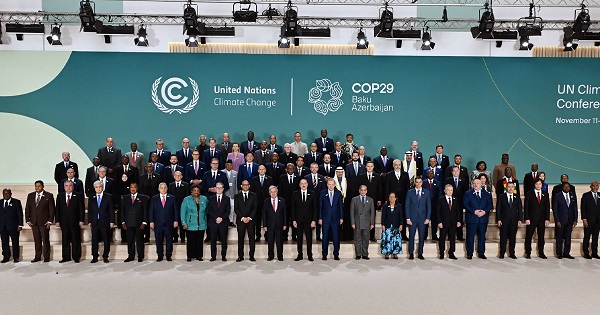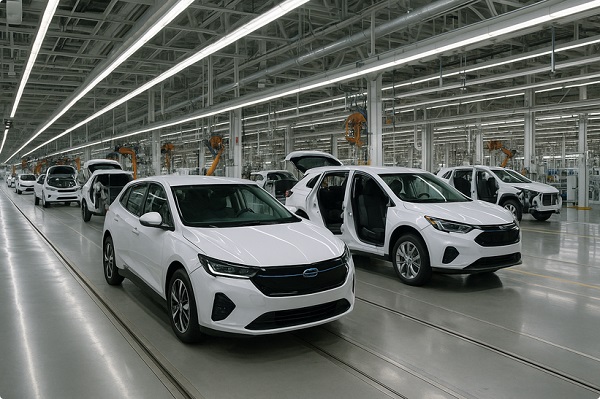Dan McTeague
COP29 was a waste of time

From Canadians For Affordable Energy

The twenty-ninth edition of the U.N. Climate Change Committee’s annual “Conference of the Parties,” also known as COP29, wrapped up recently, and I must say, it seemed a much gloomier affair than the previous twenty-eight. It’s hard to imagine a more downcast gathering of elitists and activists. You almost felt sorry for them.
Oh, there was all the usual nutty Net-Zero-by-2050 proposals, which would make life harder and more expensive in developed countries, and be absolutely disastrous for developing countries, if they were even partially implemented. But a lot of the roughly 65,000 attendees seemed to realize they were just spewing hot air.
Why were they so down? It couldn’t be that they were feeling guilty about their own hypocrisy, since they had flown in, many aboard private jets, to the Middle Eastern petrostate of Azerbaijan, where fossil fuels count for two-thirds of national GDP and 90% of export revenues, to lecture the world on the evils of flying in planes and prospering from the extraction of oil and natural gas. Afterall, they did the same last year in Dubai and there was no noticeable pang of guilt there.
It’s likely that Donald Trump’s recent reelection had a lot to do with it. Living as they do in a media bubble, our governing class was completely blindsided by the American people’s decision to return their 45th president to the White House. And the fact that he won the popular vote this time made it harder to deny his legitimacy. (Note that they’ve never questioned the legitimacy of Justin Trudeau, even though his party has lost the popular vote in the past two federal elections. What’s the saying about the modern Left? “If they didn’t have double standards, they’d have no standards at all.”)
Come January, Trump is committed to (once again) pulling the U.S. out of the Paris Climate Accords, to rolling back the Biden Administration’s anti-fracking and pro-EV regulations, and to giving oil companies the green light to extract as much “liquid gold” (his phrase) as possible, with an eye towards making energy more affordable for American consumers and businesses alike. The chance that they’ll be able to leech billions in taxpayer dollars from the U.S. Treasury while he’s running the show is basically zero.
But it wasn’t just the return of Trump which has gotten the climate brigade down. After a few years on top, environmentalists have been having one setback after another. Green parties saw a huge drop off in support in the E.U. parliament’s elections this past June, losing one-third of their seats in Brussels.
And wherever they’ve actually been in government, in Germany and Ireland for instance, the Greens have dragged down the popularity of the coalitions they were part of. That’s largely because their policies have been like an arrow to the heart of those nations’ economies – see the former industrial titan Germany, where major companies like Volkswagen, Siemens, and the chemical giant BASF are frantically shifting production to China and the U.S. to escape high energy costs.
But while voters around the world are kicking climate ideologues to the curb, there are still a few places where they’re managing to cling to power for dear life.
Here in Canada, for instance, Justin Trudeau and Steven Guilbeault steadfastly refuse to consider revisiting their ruinous Net Zero policies, from their ever-increasing Carbon Tax, to their huge investments in Electric Vehicles and the mandates which will force all of us to buy pricey, unreliable EVs in just over a decade, and to the emissions caps which seek to strangle the natural resource sector on which our economy depends.
Minister Guilbeault was all-in on COP29, heading the Canadian delegation, which “hosted 65 events showcasing Canada’s leadership on climate action, nature-based solutions, sustainable finance, and Canadian clean technologies—while discussing gender equality, youth perspectives, and the critical role of Indigenous knowledge and climate leadership” and stood up for Canadian values such as “2SLGBTQI+” and “gender inclusivity.” Once again, in Azerbaijan, which has been denounced for its human rights abuses.
And no word yet on the cost of all of this – for last year’s COP28 the government – or should I say the taxpayers – spent $1.4M on travel and accommodations alone for the 633 member delegation. That number, not counting the above mentioned events, are sure to be higher, as Azerbaijan is much less of a travel destination than Dubai, and so has fewer flights in and available hotel rooms.
At the same time all of this was going on, Trudeau was 12,000 kms away in Rio de Janeiro, Brazil, telling an audience that carbon taxation is a “moral obligation” which is more important than the cost of living: “It’s really, really easy when you’re in a short-term survive, [to say] I gotta be able to pay the rent this month, I’ve gotta be able to buy groceries for my kids, to say, OK, let’s put climate change as a slightly lower priority.”
This is madness, and it underscores how tone-deaf the prime minister is, and also why current polling looks so good for the Conservatives that Pierre Poilievre might as well start measuring the drapes at the PMO.
He has the Trudeau Liberals’ obsessive pursuit of Net Zero policies in large part to thank for that.
The world is waking up to the true cost of the Net Zero ideology, and leaving it behind. That doesn’t mean the fight is over – the activists and their allies in government are going to squeeze as many tax dollars out of this as they possibly can. But the writing is on the wall, and their window is rapidly closing.
Dan McTeague is President of Canadians for Affordable Energy.
Automotive
Canada’s EV experiment has FAILED

By Dan McTeague
The government’s attempt to force Canadians to buy EVs by gambling away billions of tax dollars and imposing an EV mandate has been an abject failure.
GM and Stellantis are the latest companies to back track on their EV plans in Canada despite receiving billions in handouts from Canadian taxpayers.
Dan McTeague explains in his latest video.
Automotive
Canada’s EV subsidies are wracking up billions in losses for taxpayers, and not just in the auto industry

By Dan McTeague
To anyone who thought that the Liberals’ decision to postpone enforcement of their Electric Vehicle (EV) mandate by one year was part of a well-thought-out plan to get that disastrous program back on track, well, every day brings with it news that you were wrong. In fact, the whole project seems to be coming apart at the seams.
Here’s the latest crisis Mark Carney and his carnival of ideologues are having to deal with. Late last year, the Liberal party instituted a 100% tariff on Chinese-made EVs. The idea was to protect the Canadian EV industry from China dumping their vehicles into our country, at prices far lower than Canadian companies can afford due to their massive state subsidies. This has been a major problem in the EU, which is also attempting to force a transition to EVs.
But Beijing wasn’t going to take that lying down. Taking advantage of Western environmentalist sentiment is an important part of their economic plans — see, for instance, how they’ve cornered the global solar panel market, though the factories making them are powered by massive amounts of coal. So they retaliated with a 75% duty on Canadian canola seed and a 100% tariff on canola oil and canola meal.
This was big enough to really hurt Canadian farmers, and Ottawa was forced to respond with more than $300 million in new relief programs for canola producers. Even so, our farmers have warned that short-term relief from the government will do little if the tariffs are here for the long-term.
With pressure on Carney mounting, his Industry Minister Melanie Joly announced that the government was “looking at” dropping tariffs on Chinese EVs in the hope that China would ease off on their canola tariffs.
That may be good news for canola producers, but how about the automotive companies? They’ve grown increasingly unhappy with the EV mandate, as Canadian consumers have been slow to embrace them, and they’ve been confronted with the prospect of paying significant fines unless they raise prices on the gas-and-diesel driven vehicles which consumers actually want to make the EVs that they don’t really want more attractive.
That’s the context for Brian Kingston, CEO of the Canadian Vehicle Manufacturers’ Association, saying that dropping these tariffs “would be a disaster.”
“China has engaged in state-supported industrial policy to create massive overcapacity in EV production, and that plan is coming to fruition now,” Kingston said. “When you combine that with weak labour and environmental standards, Chinese manufacturers are not competing with Canadian, American, or Mexican manufacturers on a level playing field. We simply cannot allow those vehicles to be dumped into the Canadian market.”
The auto manufacturers Kingston represents are understandably upset about suddenly having to compete with underpriced Chinese EVs. After all, with the government forcing everyone to buy a product they really don’t want, are most people going to patriotically pay more for that product, or will they just grab whichever one is cheaper? I know which one I think is more likely.
And then there’s a related problem — the federal and provincial governments have “invested” somewhere in the neighborhood of $52.5 billion to make Canada a cog in the global EV supply chain. In response to Joly’s announcement, Ontario Premier Doug Ford, who has gone “all in” on EVs, wrote an open letter to the prime minister saying that canceling the tariffs would mean losing out on that “investment,” and put 157,000 Canadian automotive jobs at risk.
Now, it’s worth noting that automakers all over Ontario have already been cutting jobs while scaling back their EV pledges. So even with the tariffs, this “investment” hasn’t been paying out particularly well. Keeping them in place just to save Doug Ford’s bacon seems like the worst of all options.
But it seems to me that the key to untangling this whole mess has been the option I’ve been advocating from the beginning: repeal the EV mandate. That makes Canada less of a mark for China. It benefits the taxpayers by not incentivizing our provincial and federal governments to throw good money after bad, attempting to subsidize companies to protect a shrinking number of EV manufacturing jobs.
The heart of this trade war is an entirely artificial demand for EVs. Removing the mandate from the equation would lower the stakes.
In the end, the best policy is to trust Canadians to make their own decisions. Let the market decide.
Support Dan’s Work to Keep Canadian Energy Affordable!
Canadians for Affordable Energy is run by Dan McTeague, former MP and founder of Gas Wizard. We stand up and fight for more affordable energy.
-

 Business2 days ago
Business2 days agoTrans Mountain executive says it’s time to fix the system, expand access, and think like a nation builder
-

 International2 days ago
International2 days agoBiden’s Autopen Orders declared “null and void”
-

 MAiD2 days ago
MAiD2 days agoStudy promotes liver transplants from Canadian euthanasia victims
-

 Business2 days ago
Business2 days agoCanada has given $109 million to Communist China for ‘sustainable development’ since 2015
-

 Internet2 days ago
Internet2 days agoMusk launches Grokipedia to break Wikipedia’s information monopoly
-

 Business2 days ago
Business2 days agoCanada’s combative trade tactics are backfiring
-

 Automotive2 days ago
Automotive2 days agoCarney’s Budget Risks Another Costly EV Bet
-

 Business2 days ago
Business2 days agoYou Won’t Believe What Canada’s Embassy in Brazil Has Been Up To








